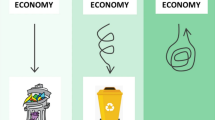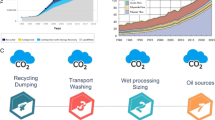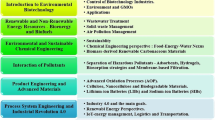Abstract
Industrial (“white”) biotechnology promises to contribute to a more sustainable future. Compared to current production processes, cases have been identified where industrial biotechnology can decrease the amount of energy and raw materials used to make products and also reduce the amount of emissions and waste produced during production. However, switching from products based on chemical production processes and fossil fuels towards “biobased” products is at present not necessarily economically viable. This is especially true for bulk products, for example ethanol production from biomass. Therefore, scientists are also turning to genetic modification as a means to develop organisms that can produce at lower costs. These include not only micro-organisms, but also organisms used in agriculture for food and feed.The use of genetic modification for “deliberate release” purposes, in particular, has met great opposition in Europe. Many industrial biotechnology applications may, due to their scale, entail deliberate releases of GM organisms. Thus, the biobased economy brings back a familiar question; is it ethically justifiable, and acceptable to citizens, to expose the environment and society to the risks associated with GM, in order to protect that same environment and to sustain our affluent way of life? For a successful innovation towards a biobased economy, its proponents, especially producers, need to take into account (take responsibility for) such issues when developing new products and processes. These issues, and how scientists can interact with citizens about them in a timely way, are further explored in projects at Delft University and Leiden University, also in collaboration with Utrecht University.
Similar content being viewed by others
References
E. Arnold P. Boekholt E. Deiaco S. McKibbin J. Mothe ParticleDe la P. Simmonds J. Stroya R. Zaman (2003) Research and Innovation Governance in Eight Countries. A Metaanalysis of Work Funded by EZ (Netherlands) and RCN (Norway) Technopolis Brighton
F. A. J. Birrer L. E. Paula J. A. B. A. F. Bonnet S. M. Lemkowitz (2002) Teaching Sustainability in a World of Subliminal Enticement K. Mulder (Eds) Engineering Education in Sustainable Development Delft University of Technology Delft 431–439
F. A. J. Birrer (2004) Subliminal Enticement and the Ethics of Sustainable Agricultural Production J. Tavernier Particlede S. Aerts (Eds) Science, Ethics & Society (EURSAFE 2004) Katholieke Universiteit Leuven Leuven 190–193
A.-K. Bock K. Lheureux M. Libeau-Dulos H. Nilsagård E. Rodriguez-Cerezo (2002) Scenarios for Co-existence of Genetically Modified, Conventional and Organic Crops in European Agriculture European Commission/IPTS Seville
CEFIC (2004), A European Technology Platform for Sustainable Chemistry. http://www.cefic.be/Files/Publications/ETP_sustainable_chemistry.pdf. last accessed on 20 March 2005
CNN (2005), http://edition.cnn.com/2005/WORLD/europe/06/30/bush.kyoto.ap/index.html. last accessed on 1 July 2005
InstitutionalAuthorNameCSEC (2001) Public Attitudes to Agricultural Biotechnologies in Europe: Final Report of PABE Project CSEC Lancaster, Lancaster University
InstitutionalAuthorNameDOE (1999) The Technology Roadmap for Plant/Crop-based Renewable Resources 2020 US Department of Energy Washington, DC
Eurobarometer (2003), Europeans and Biotechnology in 2002 – Eurobarometer 58.0, Luxemburg: Office for Official Publications of the European Communities.
InstitutionalAuthorNameEuropabio (2003) White Biotechnology: Gateway to a More Sustainable Future Europabio Brussels
InstitutionalAuthorNameEuropean Commission (2000) Towards a European Research Area COM(2000) 6 European Commission Brussels
InstitutionalAuthorNameEuropean Commission (2003) The Role of the Universities in the Europe of Knowledge European Commission Brussels
InstitutionalAuthorNameEuropean Commission (2004a) Stimulating Technologies for Sustainable Development: An Environmental Technologies action plan for the European Union. European Commission Brussels
InstitutionalAuthorNameEuropean Commission (2004b) Science and Technology, the Key to Europe’s Future – Guidelines for Future European Union Policy to Support Research. European Commission Brussels
InstitutionalAuthorNameFood Ethics Council (2004) Just Knowledge? Governing Research on Food and Farming Food Ethics Council Brighton
G. Gaskell M. W. Bauer (2001) Biotechnology 1996–1999: The Years of Controversy Science Museum Publications London
J. Habermas (1990) Moral Consciousness and Communicative Action MIT Press Cambridge
Hart, S. (1997), “Beyond Greening: Strategies for a Sustainable World,” Harvard Business Review, January–February, 66–76.
S. Kuhlmann E. Arnold (2001) RCN in the Norwegian Research and Innovation System, Background Report No 12 in the Evaluation of the Research Council of Norway Royal Norwegian Ministry for Education, Research and Church Affairs Oslo
L. Levitan (2000) How Many Ways Can We Skin this Cat Called Earth? Risks and Constraints to the Biobased Economy A. Eaglesham W. F. Brown R. W. F. Hardy (Eds) The Biobased Economy of the Twenty-first Century; Agriculture Expanding into Health, Energy, Chemicals, and Materials National Agricultural Biotechnology Council Ithaca, NY
T. MacMillan (2004) Engaging in Innovation: Towards an Integrated Science Policy Institute for Public Policy Research London
H. Nowotny P. Scott M. Gibbons (2001) Re-thinking Science: Knowledge and the Public in an Age of Uncertainty Polity Press London
InstitutionalAuthorNameOECD (2001) The Application of Biotechnology to Industrial Sustainability OECD Publications Paris
L. E. Paula (2003) Genomics and Man’s Attitude to Animals: Towards a Sustainable Relationship? Q. Est Particlevan L. Hansen (Eds) Genes for Your Food – Food for Your Genes Rathenau Institute Den Haag 59–83
J. Schot A. Rip (1997) ArticleTitleThe Past and Future of Constructive Technology Assessment Technological Forecasting and Social Change 54 251–268 Occurrence Handle10.1016/S0040-1625(96)00180-1
A. Stirling (2004) Opening Up or Closing Down? Analysis, Participation and Power in the Social Appraisal of Technology M. Leach M. Scoones B. Wynne (Eds) Science, Citizenship and Globalisation Zed London
InstitutionalAuthorNameUNFPA (2004) State of World Population 2004 UNFPA New York
J. Wilsdon R. Willis (2004) See-through Science: Why Public Engagement Needs to Move Upstream Demos London
B. Wynne (2001) ArticleTitleCreating Public Alienation: Expert Cultures of Risk and Ethics on GMOs Science as Culture 10 IssueID4 445–481 Occurrence Handle10.1080/09505430120093586
Author information
Authors and Affiliations
Corresponding author
Additional information
We include the field of genomics in our use of the term biotechnology
Rights and permissions
About this article
Cite this article
Paula, L., Birrer, F. Including Public Perspectives in Industrial Biotechnology and the Biobased Economy. J Agric Environ Ethics 19, 253–267 (2006). https://doi.org/10.1007/s10806-005-6170-2
Accepted:
Issue Date:
DOI: https://doi.org/10.1007/s10806-005-6170-2




